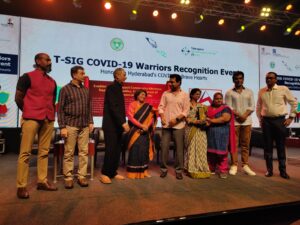Program Report
Young Eyes Pry Out Impact of COVID on Different Sections of Society
With no food for my children, I prayed for easy death: widowed mother
Got more time to instill values directly in my children: small business person.
Over 250 Students from 41 government and private schools fanned out into different areas of the South City of Hyderabad and interviewed persons from poor families, single mothers, girls & boys from deprived families, small business persons and owners of small private schools to understand how the Pandemic and the Lockdowns affected them and their families.
Findings from their field visits were an eye opener for them and also for many who heard their narratives on 20th November 2021- Child Rights Day- when COVA Peace Network in Hyderabad organised an event to facilitate students to share their reports from the field through essays, paintings and drawings. This Event was dedicated to commemorate the Memory of Ms. Naheed Banu, Founder Member and Vice President of COVA Peace Network who left us on 14th June 2020.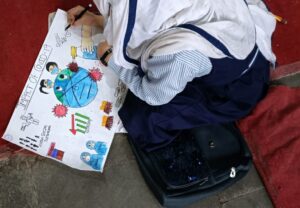
Key Findings for Different Sections
Those who interacted with and interviewed girls reported that access to education was already a challenge and after the COVID Pandemic it became worse as some parents asked the girls to discontinue studies while supporting sons to continue their education. Some repo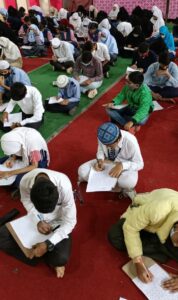 rted cases of underage girls being married off due to financial distress.
rted cases of underage girls being married off due to financial distress.
The interviews by students with single mothers were heart wrenching. One daily wage earner woman with 3 children to support had lost her job and started begging as she was unable to provide food for her children and some days they went hungry. Her constant cry to God was to make their life better or give them easy death.
Another widow with 4 children to support aged between 4 and 12 years said that though she had her job but the employer was giving only 50% salary that is not sufficient to feed her family and there were several days when the family has to go without eating anything. Another major problem is from her house owner who wants her to vacate as she is not able to pay rent regularly.
Students also interacted with owners of private schools to find the problems they are facing. As is generally known, the managements are not able to collect fees from students and as a result, are unable to pay to teachers, support staff or the rent. They lamented that though teaching is considered a noble and reputed profession, some of their teachers are now forced to work on footpaths selling fruits, vegetables, tea etc. to feed their children. A little known fact that came out from the managements is that about 30% of their students have dropped out and are either staying at home or have joined the child labour force.
Pathetic narratives were reported from small businesspersons. Razzak Ahmed, a wholesaler of footwear has 6 members in his family and his business was hit badly due to the lockdown. He had to lay off all 4 workers and sell his wife’s jewelry and take loans to retain the shop and feed his family. A friend of his who also had a business had to close it down completely and is in heavy debt with no money now.
Interestingly, different essays on impact on businesses flagged both negative and positive outcomes.
The Positive aspects are:
- Learning the value of capital and its proper use
- Able to spend more time with the family
- Sharing their childhood memories and experiences with their children
- Bonding and attachment increased within the families
- Parents could get more time to inculcate values in their children
However, some negative impacts were:
- Many businesses closed.
- Had to get children out of school as it was difficult to pay fees
- Or get gadgets for online classes
- No celebration of festivals
- Regular schedule changed impacting sleep discipline as there was no work.
- It was very embarrassing to borrow from relatives and friends
- Had to sell jewelry and other assets to feed the family and keep business going
- Some organisations were providing rations and food but they were also taking videos that were made viral. It was very shameful for people who were taking these rations due to their helplessness
The objective of this Project was to enable students to gain firsthand knowledge of the havoc that COVID and the Lockdowns played in the lives of different sections of society and develop empathy and compassion for the less fortunate.
Students who participated in this program agreed that their understanding about the impact of the pandemic on different sections of society increased and now they have developed greater empathy and spirit to support others in need.
This Program was organised by COVA Peace Network in partnership with NASIM Foundation (USA) and ICAN (Indian Citizens Action Net).
This is part of compassionate citizenship and responsible activism program of COVA Peace Network that aims to take students beyond academic learning to also sensitise them to different social issue and transform them to become compassionate citizens.
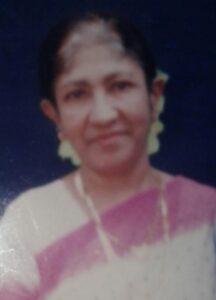
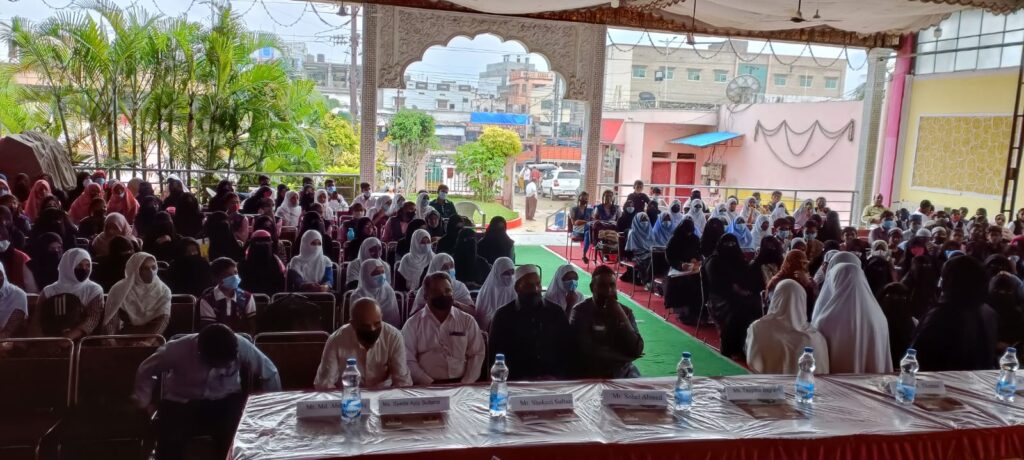
Mr. B. Vinod Kumar, Vice Chairperson, Telangana State Planning Board was invited as Chief Guest and Ms. Aziz Sultana, Mr. Mohammed Abdul Khaliq, Sardar Sajjan Singh, Mr. Sohel Ahmed, Mr. Raj Janagam and Ms. Tayyaba Bilgrami were the Guests of Honour. Bro. C.A. Thomas, Member of the Executive Committee of COVA Presided and Dr. Mazher Hussain welcomed the gathering.
Prepared by:
Roshan Shaik
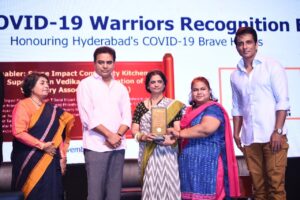
COVID 19 Warrior Citation from Government of Telangana for COVA being received by Aparna Adhikari, Secretary COVA from Mr. K. T. Rama Rao, Hon. ble Minister and and Mr. Sonu Sood, Philanthropist and Actor.
Mr. Omin Debara, President COVA and Ms. Aparna Adhikari, Secretary with the Dignitaries after receiving the COVID 19 Warriors Citation.
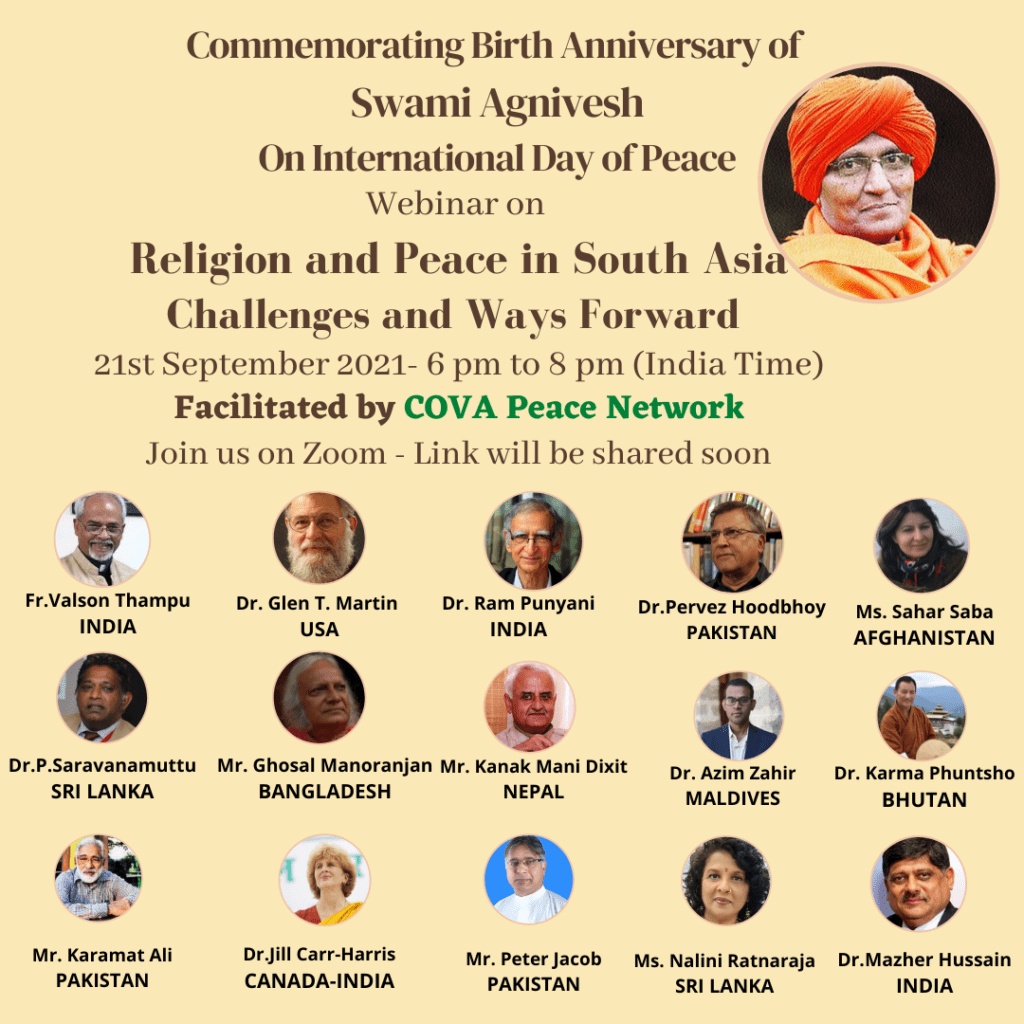 Commemorating Birth Anniversary of
Commemorating Birth Anniversary of
Swami Agnivesh
on
International Day of Peace
21st September 2021- 6 pm to 8 pm (India Time)
Webinar on
Religion and Peace in South Asia: Challenges and Ways Forward
Schedule
- Duration- 2 hours 30.minutes
- Start Time: 30 pm (Bangladesh, Bhutan) – 6.00 pm (India, Sri Lanka, Nepal,) – 5.30 pm (Pakistan. Maldives) – 5.00 pm (Afghanistan)
- Proposed Program (In India Time):
- 00 pm Welcome and Introduction of the Program- Dr. Mazher Hussain, Executive Director, COVA Peace Network, India
6.05 pm Swami Agnivesh: An inspired Life by Fr. Valson Thampu, Former Principal, St. Stephens College, India
6.10 pm Agnivesh and Global Peace: Dr. Glen T. Martin, Professor Emeritus, Radford University, USA
6.15 pm India: Impact of Religious Divide and Role of Interfaith Initiatives to Secure Peace: Dr. Ram Punyani,Peace Activist
6.25 pm Pakistan: Religious Orthodoxy & Challenges for Security of Sects & Minorities: Dr. Pervez Hoodbhoy, Physicist-writer
6.35 pm Afghanistan:Religion, State & Human Rights- Lessons for the Region- Ms. Sahar Saba, Writer, Human Rights Activist
6.45 pm Sri Lanka: Religion & Violence: Costs, Consequences Dr. P. Saravanamuttu, ED of Centre for Policy Alternatives (CPA)
6.55 pm Bangladesh: Resisting Communalism- Moving Ahead: Dr. Ghosal Monoranjan, Secretary General ‘Inter-Religion Harmony Society, Bangladesh
7.05 pm Nepal: Ensuring Political Representation for all Communities through Constitutional Provisions:Mr. Kanak Mani Dixit, Publisher, Editor and Writer
7.15 pm Maldives: Religious Fragmentation and Emerging Violence: Dr. Azim Zahir, Research Fellow, Center for Muslim States and Societies, University of Western Australia
7.25 pm Bhutan:Freedom from Religious Silos: One Truth and Vasudeva Kutumbakam: Dr. Lopen Karma Phuntsho, Spiritual Thought Leader, Author and President Loden Foundation
7.35 pm Response from Discussants
Mr. Peter Jacob, Rights Activist, Writer and Executive Director, Center for Social Justice, Pakistan,
Ms. Nalini Ratnarajah: Human Rights Activist, Feminist and Core Committee Member, SAAPE- Sri Lanka
Dr. Jill Carr Haris: Researcher and Peace Activist, Ekta Parishad, Canada- India
7.50 pm Way Forward- Mr. Karamat Ali, Executive Director, PILER, Pakistan
8.00 pm Conclusion of Presentations
Part II
8.00 pm Q & A with The Panel
Participants will be able to post their questions online to any speaker. Any of the speakers may choose to respond to general questions or comments. This Session will be moderated.
8.30 pm Vote of Thanks
PROFILES
Swami Agnivesh (21st September 1939 to 11th September 2020)
Swami Ji was a pioneer for liberation of Bonded Labour and for promotion of peace through interfaith initiatives in South Asia and across the globe.
Swami Agnivesh and Dr, Asghar Ali Engineer together received the Right Livelihood Award (also known as the Alternate Nobel Prize) in 2004 for their salutary contributions for promotion of interfaith understanding and communal harmony and Swami Ji also received the First International Anti-Slavery Award in 1990.
Swami ji, who founded World Council of Arya Samaj, was a member of the Board of World Leaders for the Elijah Interfaith Institute He was also a Board Member of the KAICIID Dialogue Centre established in Vienna in 2012 by King Abdullah of Saudi Arabia, together with the governments of Austria and Spain in 2015. He dedicated his life to a range of other social issues also like abolition of untouchability and caste system and women’s equality.
Swami Agnivesh was born on 21st September- International Day of Peace: perhaps a divine coincidence and so very befitting for his life and contributions for promoting peace in India, South Asia and across the globe.
Unfortunately, communal conflicts in South Asia are reaching dangerous levels and religions are being misused blatantly to spread hatred and violence that is gnawing at the very core of peaceful coexistence and could soon cause irrevocable damage to society.
In this disturbing context, this Webinar is organized on the Theme of:
Religion and Peace in South Asia: Challenges and Ways Forward
on 21st September to Commemorate the Birth Anniversary of Swami Agniveah and Celebrate International Day of Peace with the objective of understanding why and how religions are being misused in South Asia and explore possible Interfaith initiatives to reclaim peace in the region.
Profiles of Speakers for the Webinar on 21st September 2021
-
Mazher Hussain(India)
is the Founder and Executive Director of COVA Peace Network that is a Confederation of Voluntary Associations working on issues of communal harmony in India and peace in South Asia. He has supervised national and international research projects, produced and directed documentaries and has written award winning plays. His works are on communalism, peace, freedom movement in India, India Pakistan conflict, education system, philanthropy, disaster management, lakes and water bodies, governance, banking and financial inclusion etc. His articles are published by newspapers and journals in India and abroad and he participates in national and international TV panel discussions. Dr. Hussain serves /has served on several Boards and National Committees including State Bank of Hyderabad, Steering Committee of the Planning Commission of India for the XI and XII Five Year Plans and South Solidarity amongst others. He is involved with G 20, BRICS, The Common Wealth and PSAARC. He specializes in Strategic Policy Recommendations and at least 12 Recommendations have been accepted and incorporated by State and National Governments so far.
2. Prof. Valson Thampu (India)
has had a distinguished career in higher education, retiring as the Principal of St. Stephen’s College in 2016. Prior to that he had been a member of Delhi Minorities Commission (1999-2004) and National Commission for Minority Educational Institutions (2004-2007). He partnered Swami Agnivesh in several interfaith interventions that included a multi-religious pilgrimage to Manoharpur in the wake of the assassination of the Australian missionary Graham Staines and his two sons, a mission of compassion to Gujarat in 2002 when the riots were raging in that state, a peace march from Ayodhya to Rajghat, and so on. The book co-authored with Swami Agnivesh titled Beyond Religion: Imaging a New Humanity is pending publication. Rev. Thampu has dedicated his recent publication, Thoughts for Trying Times, to Swami Agnivesh, describing him as ‘a lightning in the mind’.
3. Glen T. Martin (USA)
He is President of the World Constitution and Parliament Association (WCPA) and Executive Director of the Earth Constitution Institute (ECI). He is author of 12 books and hundreds of articles about human liberation and the need to unite humanity under the Constitution for the Federation of Earth. His recent book that just appeared is called The Earth Constitution Solution: Design for a Living Planet. This book goes deeply into the global environmental crisis and shows that the only effective way out of this crisis is to unite humanity under the Earth Constitution. Relevant websites are www.wcpa.global and www.earthconstitution.world. Martin’s personal website can be found at www.oneworldrenaissance.com
4. Ram Punyani(India)
is a former professor of biomedical engineering with the Indian Institute of Technology Bombay. He began his medical career in 1973 and served IIT in various capacities for 27 years, beginning 1977. He has been involved with human rights activities and initiatives to oppose Hindu fundamentalism in India. He is associated with various secular initiatives and has been part of various investigation reports on violation of human rights of minorities. He regularly conducts seminars and workshops on topics related to the threat of communal politics, human rights, values of secularism, the Uniform Civil Code debate, the partition tragedy, Kashmir imbroglio and others. He is known for his articles and essays which regularly appear in Indian magazines and newspapers.
5. Pervez Amirali Hoodbhoy(Pakistan)
is a physicist, writer, and human rights activist based in Islamabad. He taught physics for 47 years at Quaid-e-Azam University, Islamabad (1973-2021). Earlier he had been visiting professor at MIT, Carnegie Mellon University, and the University of Maryland. In 2013, he was made a member of the UN Secretary General’s Advisory Board on Disarmament Affairs (2013-2017). He is a prolific writer on issues of minorities, human rights, communalism and governance issues apart from his contributions as physicist to professional journals. In 2019 he received the honorary doctor of law degree from the University of British Columbia.
6. Sahar Saba (Afghanistan)
is an Afghan women rights’ activist. She has worked for many years in refugee camps in Pakistan and in Afghanistan in areas of education, advocacy, communication, and human rights. She has conducted training workshops on gender and human rights and communication in Kabul and other cities of Afghanistan. She has travelled to many countries in the past several years to speak on Afghanistan. She has a law degree from London University, and MA in Media from the School of Oriental and African Studies (SOAS). She writes on issues facing Afghan women. Sahar has keen interest in gender issues in media, human rights, and women’s grass root activism in Afghanistan. Currently, she is studying at Luleå Technical University.
7. P. Saravanamuttu(Sri Lanka)
has a Doctorate from London School of Economics and is the Founder and Executive Director of the Centre for Policy Alternatives (CPA), He is also a member of the Foreign Policy Advisory Group of the Board of the Lakshman Kadirgamar Institute for International and Strategic Studies. He has presented papers on governance and peace in Sri Lanka and at a number of international conferences. In 2010, Dr. Saravanamuttu was awarded the inaugural Citizens Peace Award by the National Peace Council of Sri Lanka and in September 2013, he was invited by President Obama to attend his “High Level Event on Civil Society” in New York. In 2016, he was appointed, Secretary of the Task Force on Consultations on Mechanisms for Reconciliation. He is also a member of the Regional Advisory Group of Amnesty International for Asia.
8. Dr.Ghosal Monoranjan(Bangladesh)
did his Masters degree from Dhaka University before independence of Bangladesh. He is an experienced journalist for 4 decades, a celebrity singerof Radio & Television for 56 years, writer of 5 books and a valiant Freedom Fighter. He is the Secretary General, Inter Religion Harmony Society; Chairman, Cultural Squad, Forum for Secular Bangladesh, an organ of Ekattorer Ghatak Dalal Nirmul Committee; Vice President,Bangobondhu Sangskritik Jote; Vice Chairman, Bangladesh Radio & Television Shilpi Sangstha and Chairman, Hindu Heritage Foundation. He has lectured extensively on Interfaith Issues in Washington, Rome, Delhi, Sri Lanka, South Korea and most of the Universities of Bangladesh.
For exceptional services in Interfaith activities, Indian Institute of Oriental Heritage awarded him a Ph.D degree.
9. Dr. Kanak Mani Dixit (Nepal)
is a publisher, editor and writer. He is the founder of the magazine Himal Southasianand co-founder of Himalmedia. Dixit was born in Lalitpur. He studied at the Columbia University, where he obtained two Master’s degrees, one in 1981 in international relations and another a year later in Journalism. He worked for eight years from 1982 until 1990 at the secretariat of the United Nations in New York City. In 1987, he founded the bimonthly magazine Himal which subsequently became Himal Southasian. He is also the author of several children’s books and the founder of Film South Asia (FSA), a film festival for documentary films. He also works in spinal injury rehabilitation, public transportation, archiving, and architectural and environmental preservation. He was honored with a Prince Claus Award from the Netherlands in 2009.
10. Dr Azim Zahir (Maldives)
is a Research Fellow at the Centre for Muslim States and Societies, the University of Western Australia. He has a PhD in Political Science and International Relations from UWA. Zahir’s research interests include political Islam, democratisation, violence, and radicalisation, with a focus on South Asia.
11. Lopen Dr. Karma Phuntsho (Bhutan)
is a spiritual thought leader and author. He teaches Buddhism and Bhutan Studies and his work has received extensive media coverage including by BBC, BBS, Kuensel, Science, Radio Free Asia, Times of India, India Today, Channel News Asia, etc. Having finished his full monastic training, he joined Oxford to pursue a DPhil and has worked as a researcher at Cambridge University, CNRS, Paris and University of Virginia. He is currently Writer-in-Digital-Residence for Tsadra Foundation and the President of Loden Foundation. He is the author of over 250 articles, essays and books including The History of Bhutan.
12. Karamat Ali (Pakistan)
is an eminent labour and development activist for the last four decades. He is the founder of Pakistan Institute of Labour Education & Research (PILER) and a founding member of various local and regional networks like Pakistan Peace Coalition, Pakistan-India People’s Forum for Peace and Democracy and South Asia Labour Forum. He has been a part of labour and peace movements in Pakistan and has played a key role in linking up these movements with regional and global counterparts.
13. Jill Carr Harris (Canada- India)
Since 2000 Jill has committed herself to women and land issues as a volunteer through a people’s organization known as Ekta Parishad. After 2010 Jill began to rediscover Gandhi and ahimsa (nonviolence) as a way to negotiate social change for poor communities. She completed a Master’s degree on ‘learning in nonviolent (Gandhian) social movements. Then she took up a doctoral degree on nonviolent (Gandhian based) education from University of Toronto Canada. Jill and Rajagopal conceived and coordinated Jai Jagat 2020 a year long Global Peace March from New Delhi to Geneva. The idea was that by interacting with scores of people by walking from Delhi to Geneva, they could be facilitated to rediscover what Gandhi meant by linking local communities to larger structures of society that were nonviolent, sustainable and equitable. She coordinates training and research program in South India on Gandhian Nonviolence and Peace and, she travels within India and abroad imparting education and action programs.
14. Peter Jacob (Pakistan)
is a human rights professional, researcher, freelance journalist and trainer. He has been associated with several national and international human rights organizations since 1988 in different capacities including Amnesty International Pakistan, Hotline Asia, Forum Asia and Human Rights Commission of Pakistan. Jacob studied Political Science, Rural Development and Law in Pakistan. He earned an LLM degree in International Human Rights Law (2014) from University of Notre Dame (USA). He is currently working as the Executive Director of Centre for Social Justice (www.cskpak.org), a Pakistan based research and advocacy organization.
15. Nalini Ratnarajah (Sri Lanka)
is a peace activist and a defender of gender justice and human rights. She is presently working in Search for Common Ground as a gender advisor for Sri Lanka & Afghanistan. She is a columnist, motivational speaker and an expert trainer in gender justice, human rights, communication skills, development and leadership who has conducted sessions in Sri Lanka and abroad. Nalini is a researcher and a documentary maker on the challenges of women in conflict situations. She is also Sri Lankan coordinator for Channel News Asia TV, Singapore.She is currently the Executive Director of Women’s Development Innovators, a Core Committee Member of South Asian Alliance for Poverty Eradication (SAAPE) and actively involved with Peoples’ SAARC, and South Asian Feminist Alliance (SAFA) .
Overview
COVA Peace Network, is a Confederation of Voluntary Associations working for social harmony and community empowerment in India and peace in South Asia. Established in 1995 in Hyderabad, India, the members and partners comprise of community groups working at grassroots to national and international organisations and networks undertaking advocacy and policy interventions. COVA Peace Network is also engaged with state and national governments and multilateral bodies for structural transformations to make society more equitable, sustainable, just and peaceful. For more information please visit: www.covanetwork.org

